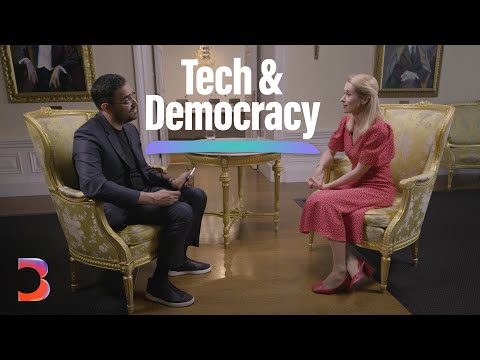How Estonia Became a Model for Digital Democracy

As large democracies become modern digital states, they'll get inspiration from their smallest allies. That is the premise for today's conversation. Welcome to Exponential A.I. is not only changing how we live.
It's also forcing governments to reinvent themselves to become digital natives. How can large nations like the US into the future without becoming vulnerable to the digital downsides of cyberattacks and polarization? Estonia is a tiny ex-Soviet republic that has successfully turned to the West joining the EU naito in the World Trade Organization. The country is voraciously digital, the first to offer nationwide online voting, and nearly every government service is on the web. Yet all of this from a nation which only
restored its independence from the Soviet empire in 1991. They've managed to do it with a tiny population, 1.3 million. That's about the same as San Diego. And they suffered the first national cyber attack way back in 2007. And despite this, or perhaps because of it, Estonia is really taking advantage of A.I..
What can other countries learn about managing this digital transition? I came to the capital, Tallinn, to discuss this with Kyiv Kallas, the recently re-elected prime Minister. It's remarkable because just a little over 30 years ago, Estonia was under Soviet oppression. And Estonia's own journey has been an exponential one in just three decades. I'm very curious to learn from you
initially how distant or close to those times of Soviet rule and rule from Moscow feel to you today? Well, they feel distant, but at the same time not so distant. I was born on the Soviet occupation, and then we restored our independence. And seeing the development in our economy, I mean, our GDP has risen by 3.5 times over this
time. And our salaries have risen 45 times. Wow. Compared to the beginning. So it has been a remarkable journey. But we are a small country.
And of course, we had to build everything from scratch because, you know, so many things that the Soviet occupation normalized, for example, like corruption. And so we had to start from zero, even subzero. It's interesting that you use the word Soviet occupation about the 50 year period that Estonia was part of the USSR, because, of course, it's so close to Finland, it's a 20 minute plane ride up. I guess you must have had access to finished media growing up as well, in a way perhaps, that other Soviet republics didn't couldn't access it? No, I said, Yeah, this is true, but we never fit under that occupation. So it is belonging to the Western world then was also why all the Russians wanted to come to Estonia during that time. And in a 1920s our Russian population was about 3.2%.
But as they deported Estonians and brought in Russians after or in the end of Soviet occupation, it was 30%. And your your family was affected with the deportations. I think some members of your family were deported by Stalin. Yeah. This is not a unique story in Estonia. I mean, every family has a story like
this. My family, my mother was only six months old, baby, when she was deported to Siberia in the catching back end with my grandmother and great grandmother while my grandfather was sent to prison camp. But we are sitting here in the state elders room, and the pictures you see on those walls are of our political elite of the 1920s. And if you look at their dates of death, they were all killed or died in captivity when the occupation started. In fact, some of the the death dates all
with question marks. Because you don't know. We don't know. We don't know when that when that happened. And there might have been some resentment. And yet you manage to have a country
that doesn't seem to have even now. A lot of ethnic conflagration between these between these two groups. And I say even now, of course, because we're setting more than a year into Russia's illegal invasion of Ukraine. As we say here, we might have a different past with our Russian speaking minority, but we have a common future. Our Russian speaking minority,
especially those who are living closer to Russia, they can see that life on the Russian side is so much worse than it is on the Estonian side. So they are clearly with us and they understand what is going on in Ukraine. And what we are seeing in Ukraine unfolding is the same atrocities that our grandparents went through. And that is why it is so black and white and the sufferings that our grandparents went through. We want to avoid those for anybody else. Did you hear the stories from your grandmother and from your mother as you were growing up? Yes, of course we heard the stories. But on the positive side, I must say
that when we celebrated our 30th anniversary of restoring our independence, then I, as a prime minister, asked the young people to write me essays about those times when we restored our independence, and that while I was reading those essays, what struck me was that our young people nowadays are exactly the same as the German or the French young people because they take freedom for granted. And for me, I mean, I am of the lucky generation that didn't have freedom and has the freedom now. So I'm not taking this for granted. The phrasing you use that your you were in the lucky generation who didn't take freedom for granted. My grandparents, they had everything. They had the freedom to move. They had the freedom of choice. And everything was taken from them.
And I was born under Soviet occupation. We didn't have any choice. We couldn't go to a foreign country. And now we have we have all that. But I was happy to read their essays to understand that we have done something right because they don't have the fears that my generation has.
Who remembers that it can all fall apart again? I suppose maybe it's a it's an unvarnished opinion from me. But I picture Estonia and Estonian society as more resilient than the UK or the US is. And I wonder whether I build that picture because of your proximity to Russia.
Because in 2007 you were the first country to suffer a sovereign cyberattack largely believed to emanated from Moscow. It is clear that that we were attacked in 2007 and we after that concentrated on, I mean, building our resilience. But it was a cyber attack. Cyber attack was a cyber attack. But but this is also during this war, we see the conventional war in Ukraine, but there's also hybrid war, an information war, a cyber war going on, energy war going on. In 2007, we established this computer emergency rescue team that is also helping not only the government, but also the company, because it is about the weakest link. And we are so connected.
Everybody, even hospitals. A few years ago, they only had to worry about some drug addict coming and stealing the morphine. Now they are a security risk because if they are cyber attacked, you know, there could be civilian casualties. And when companies are cyber attacked, they feel ashamed, you know, that we let our guard down and we didn't.
I mean, and it went through and we paid ransom or or something like that. And they don't talk about this. But the good guys should share information because the bad guys do share information. Right? So in order to prepare for future cyber attacks, we have to share this information if something happens, because then others can build on that experience and build their resilience on it. And this is extremely, extremely important. Super interesting. Of course, a firm believes that being cyber attacked is a bad thing.
They will really do the minimal reporting they need. Exactly. Exactly. Which then makes the next cyber attack more more likely and more likely and and other companies more vulnerable. And why we have this computer emergency rescue team that is now also helping the companies to find the vulnerable places. It's not anymore that, you know, the security of a country only depends on on a government. It's also the private companies.
And I think what is also may be different here is that our people trust government and government services regarding digital issues, whereas maybe not so much the private companies. Right. Whereas in some other countries it's more like people give away a lot to the private companies and there's like, Oh, I'm not giving it to the state. But I think what is important that I always stress this is the digital identities. I mean, in the real world, country
issues of passport, you are who you say you are. Absolutely. In the online world. It is not always the country on the Internet. No one knows your dog. Exactly. Exactly. My famous, famous cartoon is that the power of Internet is that nobody knows yours how well the digital identity solves that issue. And that's why we have that.
And you have to use this digital identity. And you can and you can really be sure that you are who you say you are. Not that, are you? 18? Check the box. Yes, I 18. The first time I came to Estonia more than 20 years ago, it was to come and look at some private companies. I saw a company called Privado out of the University of Tartu. It's now known as God's Time, which is
quite a successful security and encryption company. And of course, you had the tremendous success with Skype, and Skype gave birth to a new ecosystem. And companies like TransferWise, known as Wise and Bolt and Pipedrive and Pachter and Starship, which makes little robots that deliver deliver food.
Here I host every year the student companies. And what is interesting about this is that our market is so small that all the students think about the global problems that they want to solve, right? And that's why we have more startups per capita and a lot of good ideas. Well, most startups per capita, I think amongst the highest venture capital per per capita, the funds that are required to get these startups going.
But I was curious about why why do you think Estonia has that special sauce? Is it about having to rebuild an economy because the Soviet Union hadn't left a robust economy here in the Soviet Union? It didn't have any private property. So you didn't have any market economy. When you haven't had those opportunities, you are so willing to use those opportunities that unfold. So that is the first thing. The second thing is the education, definitely. So trying to focus on on STEM subjects and everything you said we had no market economy, and that's very hard for many of us to to understand.
So what does that mean? The civil code of of Estonia was really, really small because it didn't have a lot of paragraphs because you didn't have any property to so you didn't need any laws to exist and you didn't really have all those agreements and everything had to be built from scratch. And so first thing we understood back then was that what makes investors trust your country is the rule of law. So building the laws and the legal system was very important in order to attract investments and also keeping that and getting rid of corruption. And I started in a law firm when I was
18 giving advice because the clients were young, the market was young, the is were young. A lot of things were forgiven. And I think this mentality has remained that, you know, the startup mentality that also for the government so that it's okay to fail because you learn something on the way and you can, you know, rebuild on that. If I sum up. What this this journey looks like. There is a sense of nationhood that delivers a national resilience.
And that resilience comes from having not had freedom perhaps, and then having freedom and understanding its value, living next to a threat, which leads to also to the development of the framework for opportunity. Right. You build these new laws, these institutions that enable a democratic and market economy connected to a strong education system that had, you know, a focus on STEM and then perhaps a little bit of good fortune that if this happens around the time the digital revolution is taking place, we introduced the digital identities already 2000 where many didn't have Internet. That is also the leadership from the government side, because people didn't know that they need digital identities. But but building the framework and starting to build the sea governance and also the data that you get from this and making it open to the the companies and using that, I think was one of the fundamental to being a small nation. By being digital, you can be much bigger.
We have the residence program and we are having all the services that the residency program is so clever. It allows someone who's not an Estonian citizen to get an E residency in Estonia so they can start to build a business that can work in the digital marketplace, but have the benefits of Estonia's relationships within the EU and Estonia's legal system, even if they don't necessarily come physically, physically from here. I mean, what's that actually done for for Estonia? So that also means the tax money eventually.
And it also means that you have a lot of friends around the world. I mean, when Brexit happened, we had a lot of investors coming. Many of my friends from the U.K., that's like, okay, how can we still enjoy the the European Union and everything that is related to it? I think what we have understood since 2000 is that people are more and more living their lives online, right? So the government also has to be there with the services. Otherwise the people just alienates from the state because I can do everything online.
The only establishment or institution that I can't deal with is my government. And I think the government should be where the people are. But that requires the identities. Then we could solve so many issues with this. There's something else that I found
really fascinating. As a government, you're only allowed to ask the citizen once for their information. And so every department has to use the information the government already has. Whereas if you're in the United States or in the UK and you're trying to do something with a different government department, you're in there typing in the same information time and time again.
Is that a cultural trope? Is that a design decision? Was there some somebody who thought, this is really important for us to get a, you know, legitimacy? It's all about customer experience, really. We don't use the plastics for the your driver's license anymore, so you don't know when it's going to expire really, because you don't really use it as such. So my state writes me an email and your driver's license is expiring. You have two choices either to go to the office if it costs you more or to do it online, you have to get your doctor's approval that you can still drive a car. And is this still your signature?
We have this is still your address. Is that the picture we can use? We have that picture of you. Yes. Check, check, check. And it's done. And now we are trying to do like more of this personalized event based services so that, for example, your kid is born. So the government says that, okay, you can register here, you can do this, you have to do this. And so you don't have to think that. What else do you have to do? Because you are the first time parent and you don't really know. You have a lot of headspace that is.
Eric Idle Yeah, yeah, that is true. Yeah. But technology is changing constantly. I mean, it's changing exponentially. And we in the last five, ten years have seen this incredible transformation through artificial intelligence and many, many new risks emerging from it. So what do you do as a forward looking government in terms of addressing the risks of AI, the questions that need. We asked our side of it. We see this on the European level that we could use or diminish the administrative burden by by using the air. So you see that as an efficiency opportunity.
Absolutely. But there's still this problem of the idea of the black box idea that there's some creature that is making decisions about my life that I can't perhaps inspect. We can't pretend that this is not coming. So we are ignoring this. No, we don't do that.
But at the same time, we are very cautious of overregulating because if you start to regulate in a very early phase, then you focus on the incumbents, because this is about, you know what, okay, this way it operates. But every time you focus on the incumbent, you actually make the rules that are made for the incumbent and not for everybody else. So so the balance question is about the, you know, how to not kill innovation. At the same time, addressing the risks that there are. I think that very often under Europe, the EU has got big fight today on exactly that. I wanted to point out the European Union
is focusing, trying to get all the risks. And I think that is not finding and striking the right balance regarding this. So I think it needs more of still this startup mentality that, of course, the cooperation with companies that are working on the AI, but also going to to find this this balance in between so that you don't kill the innovation on the way.
And it is difficult, I must say, in our government we tried to find ways we can use the AI and we have over 100 user cases already where we use that. The premise of our conversation was that as we move into these exponential times of radically changing technologies, that legitimacy, resilience and engagement will be critical capabilities for the governments and that digital capabilities are the ones that will allow that to happen. To what extent do you think that these are lessons that can be learnt and should be learnt by other countries, in particular larger countries? Well, there are many lessons on the way, and I always say that when we have tested something, you know, it's like a better version before you go online.
In the bigger scale we have tested. So here is the beta test. Yes, exactly. So we have tested that. And these are the bugs. So we have tried to show other
countries. So what is our experience regarding this? But I think we have to cooperate. And I see that the there is a difference of mindset. I mean, I bring you one example.
We had a debate on the European level and the representative of one country said to to something that we were doing. It's like, oh my God, you're doing this. And this is the most sensitive data there is. And I replied that it's also the data that helps the people the most. So it depends how you see it. Do you only see the risks or you also see the opportunities that there are? And of course, you can't overlook the risks. I am not anyway proposing that, but you have to see the opportunities again. If the private companies are driving
this, then the governments are left behind. And if the tools are there, you can't know out regulate them because that's they are already there. It's like the industrial revolution, you know, you can't say that you can't use the shooting machine when it has been invented. You have to think about what comes with it. Oh, reflecting on my conversation with the Prime Minister, I'm struck by a few things.
She really gets digital. She understands what government apps should look like and what citizens need from them. But she also raised the importance of values, the values of public private cooperation, the values of alliances, and the values of protecting democracy. Perhaps because the memory of oppression is still so recent in Estonian memory. But I think these are all great lessons for bigger countries as well.
I'm Azeem Azhar, and you've been watching exponentially. Or.
2023-09-09 14:07


